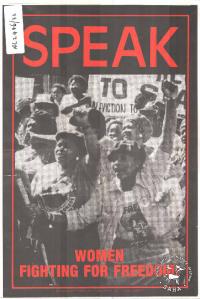|
23 July 2012
26 years since the obligatory requirement for all blacks to carry passes was repealed
 This law, which forced all black people from the age of 16 to carry passes at all times, was introduced as a way of monitoring the movement of blacks in "white" areas. This document was proof that one is authorised to live or move in any given white area. This law, which forced all black people from the age of 16 to carry passes at all times, was introduced as a way of monitoring the movement of blacks in "white" areas. This document was proof that one is authorised to live or move in any given white area.
Although the obligation to carry a pass also commonly known as dom pas (dumb pass) was lifted on 23 July 1986, marking 26 years in 2012, blacks were still required to have the document in their possession.
This law is reported to have been first introduced in the 1700s by Earl Macartney, a colonial administrator, in an attempt to exclude all natives from the Cape Colony. It became a proper law, the Natives (black) Urban Areas Act of 1923 on 14 June, 1923. This law extended the pass system such that the only black women allowed to live in urban areas were domestic workers.
The pass law was amended various times to impose stricter restrictions as required in line with the status quo. Various protests were prevalent across the country against this law, notably, the 1960 march in Sharpeville where the apartheid government police forces retaliated by killing 69 people and leaving over 180 injured in what is now known as the Sharpeville Massacre.
Another significant protest against this law was the women's march of 9 August, 1956 where over 20 000 women of all races marched in unison to the Union Buildings in Pretoria to hand over a petition to the then South African prime minister Hans (JG) Strijdom. The infamous song ‘Wathint' Abafazi, Wathint' Imbokodo' (you strike women, you strike a rock) was sung at this march.
It has since become a slogan in almost all womanly gatherings where matters pertaining to their rights are discussed. The song also represents women's courage and strength in South Africa.
The 9th of August has since been declared National Women's Day, a public holiday in South Africa, in honour of the women who marched against the pass laws on that day as the struggle they fought was for the greater good of all South Africans. The month of August has also come to be known as the ‘Women's Month'.
In commemoration of Women's Month, SAHA is gearing up to launch a virtual exhibition to recognise and pay tribute to the selfless contribution made by our female icons in bringing about change in the South African society. |





 This law, which forced all black people from the age of 16 to carry passes at all times, was introduced as a way of monitoring the movement of blacks in "white" areas. This document was proof that one is authorised to live or move in any given white area.
This law, which forced all black people from the age of 16 to carry passes at all times, was introduced as a way of monitoring the movement of blacks in "white" areas. This document was proof that one is authorised to live or move in any given white area.